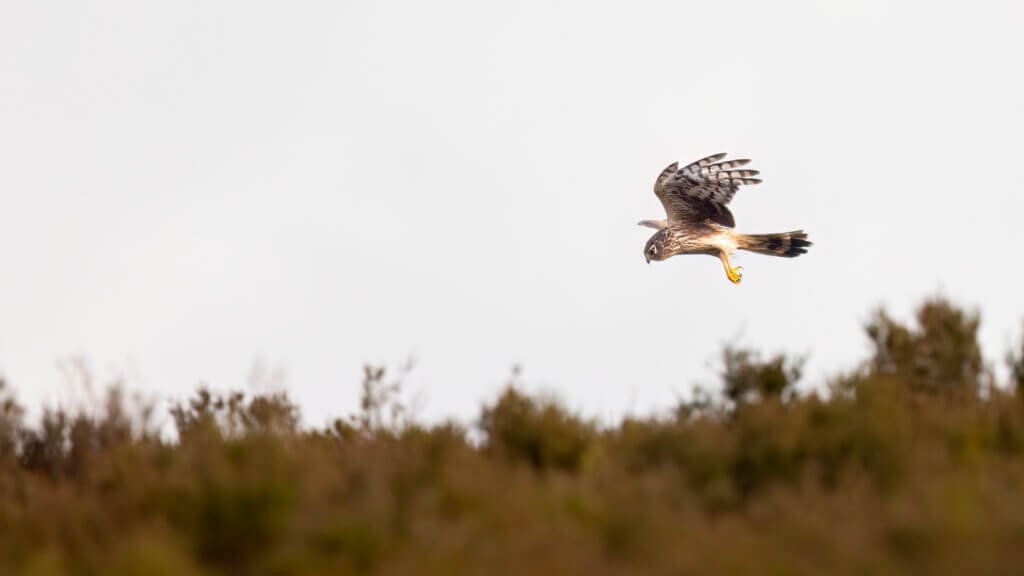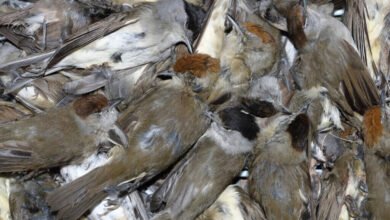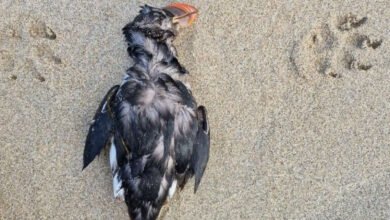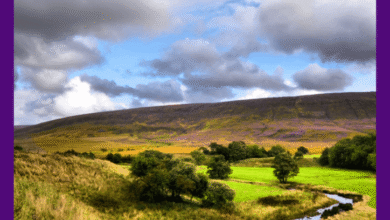
- Over the past five years, record numbers of Hen Harriers have been killed or have gone missing according to a new report from the RSPB.
- Most of these incidents have occurred on or near grouse moors in northern England.
- The RSPB is calling on the Westminster Government to introduce licensing of grouse shooting in England as has happened in Scotland to act as a meaningful deterrent to wildlife crime.
One of the rarest birds in the UK – the Hen Harrier – has seen record numbers being illegally killed or going missing in suspicious circumstances over the past five years.
A new RSPB report – Hen Harriers in the firing line – shows that the majority of the 102 incidents occurred on or near grouse moors. Hen Harriers breed in the uplands of Britain and this is where they come into conflict with grouse shooting.
Hen Harriers are a rare, protected species, known for their acrobatic ‘skydancing’ courtship display over the uplands. The Hen Harrier is categorised as a red-listed species in the UK, due to its low breeding population levels, following historic declines as a result of human persecution.
Despite several conservation initiatives over the past twenty-five years, the Hen Harrier is now the most persecuted bird of prey in the UK for its population size.
The UK population increased between 2016 and 2023, however, 2023 was the worst recorded year for persecution. Hen Harriers remain far less abundant or widespread than they should be, and the current UK population estimate represents only a quarter of the potential population their ideal habitat can support, and in England it is less, about 10%.
Despite being legally protected, multiple studies and reports confirm that criminal activity is the main factor limiting the recovery of Hen Harrier in the UK, causing a reduction in nesting success, annual productivity, and survival of breeding birds. Despite decades of persecution no one in England has ever been convicted of an offence. Most of these crimes take place in remote areas where such activity is hard to detect and a criminal burden of proof against the perpetrators near impossible to secure.
Dr James Robinson the RSPB’s director of operations said “The last five years have seen a record number of illegally killed or disappearing Hen Harriers with 102 suspected or confirmed incidents, the majority happening on or close to grouse moors. This species will not recover until the criminal activity stops, and for this to happen we need regulation of the grouse shooting industry, specifically, the introduction of a licencing system for shoots in England, so estates proven by the Police and Natural England to be linked to raptor persecution would simply lose their licence to operate.”
Another recent study which investigated the illegal killing of Hen Harriers in association with gamebird management showed that the survival rates of Hen Harriers in the UK are “unusually low” with birds surviving for an average of just 121 days after leaving the nest, and persecution accounting for 27-41% of deaths of Hen Harriers aged under one year and 75% of deaths in birds aged between one and two years. It also highlighted a strong overlap between Hen Harrier mortality and the extent of grouse moors.
This new report contains the details of Hen Harriers being shot, their chicks being stamped on and one bird having its head pulled off whilst still alive. This alongside 112 satellite-tagged birds disappearing on or near grouse moors between 2010 and 2024 has led the RSPB to yet again call on the government to regulate the industry and licence grouse moors, as is now law in Scotland.
The Wildlife Management and Muirburn Act, passed in March 2024, means all grouse shoots in Scotland require a licence to operate, and this licence could be revoked if evidence suggests a crime has been committed. Licensing is based on evidence to a civil burden of proof, meaning that it is easier to take action when persecution has taken place. This progressive legislation will help ensure legal and sustainable management across a significant area of upland Scotland and introduces a much-needed deterrent for those who kill birds of prey for economic reasons. But England now lags behind.
This report comes ahead of a parliamentary debate at Westminster Hall on Monday 30 June on the future of Grouse Shooting, triggered by petition launched by the campaign group Wild Justice. Over 100,000 people signed their petition calling for a ban on driven grouse shooting, as they, like the RSPB, want to see an end to the illegal killing of birds of prey and other harmful practices associated with the grouse shooting industry. Action on this issue by Government in England is long overdue, and we will be expecting to hear how the Government intends to end the killing, before it is too late for England’s Hen Harriers.
ENDS
[registration_form]
Source link




